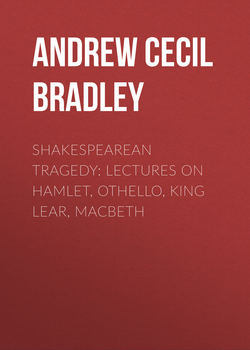Shakespearean Tragedy: Lectures on Hamlet, Othello, King Lear, Macbeth

Реклама. ООО «ЛитРес», ИНН: 7719571260.
Оглавление
Andrew Cecil Bradley. Shakespearean Tragedy: Lectures on Hamlet, Othello, King Lear, Macbeth
PREFACE
NOTE TO SECOND AND SUBSEQUENT IMPRESSIONS
INTRODUCTION
LECTURE I
THE SUBSTANCE OF SHAKESPEAREAN TRAGEDY
1
2
3
4
5
LECTURE II
CONSTRUCTION IN SHAKESPEARE'S TRAGEDIES
1
2
3
4
LECTURE III
SHAKESPEARE'S TRAGIC PERIOD—HAMLET
1
2
3
4
LECTURE IV
HAMLET
1
2
3
4
5
LECTURE V
OTHELLO
1
2
3
LECTURE VI
OTHELLO
1
2
3
4
5
6
LECTURE VII
KING LEAR
1
2
3
LECTURE VIII
KING LEAR
1
2
3
4
5
LECTURE IX
MACBETH
1
2
3
LECTURE X
MACBETH
1
2
3
4
5
NOTE A
NOTE B
NOTE C
NOTE D
NOTE E
NOTE F
NOTE G
NOTE H
NOTE I
NOTE J
NOTE K
NOTE L
NOTE M
NOTE N
NOTE O
NOTE P
NOTE Q
NOTE R
NOTE S
NOTE T
NOTE U
NOTE V
NOTE W
NOTE X
NOTE Y
NOTE Z
NOTE AA
NOTE BB
NOTE CC
NOTE DD
NOTE EE
NOTE FF
Отрывок из книги
In these impressions I have confined myself to making some formal improvements, correcting indubitable mistakes, and indicating here and there my desire to modify or develop at some future time statements which seem to me doubtful or open to misunderstanding. The changes, where it seemed desirable, are shown by the inclusion of sentences in square brackets.
Such lovers read a play more or less as if they were actors who had to study all the parts. They do not need, of course, to imagine whereabouts the persons are to stand, or what gestures they ought to use; but they want to realise fully and exactly the inner movements which produced these words and no other, these deeds and no other, at each particular moment. This, carried through a drama, is the right way to read the dramatist Shakespeare; and the prime requisite here is therefore a vivid and intent imagination. But this alone will hardly suffice. It is necessary also, especially to a true conception of the whole, to compare, to analyse, to dissect. And such readers often shrink from this task, which seems to them prosaic or even a desecration. They misunderstand, I believe. They would not shrink if they remembered two things. In the first place, in this process of comparison and analysis, it is not requisite, it is on the contrary ruinous, to set imagination aside and to substitute some supposed 'cold reason'; and it is only want of practice that makes the concurrent use of analysis and of poetic perception difficult or irksome. And, in the second place, these dissecting processes, though they are also imaginative, are still, and are meant to be, nothing but means to an end. When they have finished their work (it can only be finished for the time) they give place to the end, which is that same imaginative reading or re-creation of the drama from which they set out, but a reading now enriched by the products of analysis, and therefore far more adequate and enjoyable.
.....
The sources of these impressions are various, and I will refer only to a few. One of them is put into words by Shakespeare himself when he makes the player-king in Hamlet say:
'their ends' are the issues or outcomes of our thoughts, and these, says the speaker, are not our own. The tragic world is a world of action, and action is the translation of thought into reality. We see men and women confidently attempting it. They strike into the existing order of things in pursuance of their ideas. But what they achieve is not what they intended; it is terribly unlike it. They understand nothing, we say to ourselves, of the world on which they operate. They fight blindly in the dark, and the power that works through them makes them the instrument of a design which is not theirs. They act freely, and yet their action binds them hand and foot. And it makes no difference whether they meant well or ill. No one could mean better than Brutus, but he contrives misery for his country and death for himself. No one could mean worse than Iago, and he too is caught in the web he spins for others. Hamlet, recoiling from the rough duty of revenge, is pushed into blood-guiltiness he never dreamed of, and forced at last on the revenge he could not will. His adversary's murders, and no less his adversary's remorse, bring about the opposite of what they sought. Lear follows an old man's whim, half generous, half selfish; and in a moment it looses all the powers of darkness upon him. Othello agonises over an empty fiction, and, meaning to execute solemn justice, butchers innocence and strangles love. They understand themselves no better than the world about them. Coriolanus thinks that his heart is iron, and it melts like snow before a fire. Lady Macbeth, who thought she could dash out her own child's brains, finds herself hounded to death by the smell of a stranger's blood. Her husband thinks that to gain a crown he would jump the life to come, and finds that the crown has brought him all the horrors of that life. Everywhere, in this tragic world, man's thought, translated into act, is transformed into the opposite of itself. His act, the movement of a few ounces of matter in a moment of time, becomes a monstrous flood which spreads over a kingdom. And whatsoever he dreams of doing, he achieves that which he least dreamed of, his own destruction.
.....